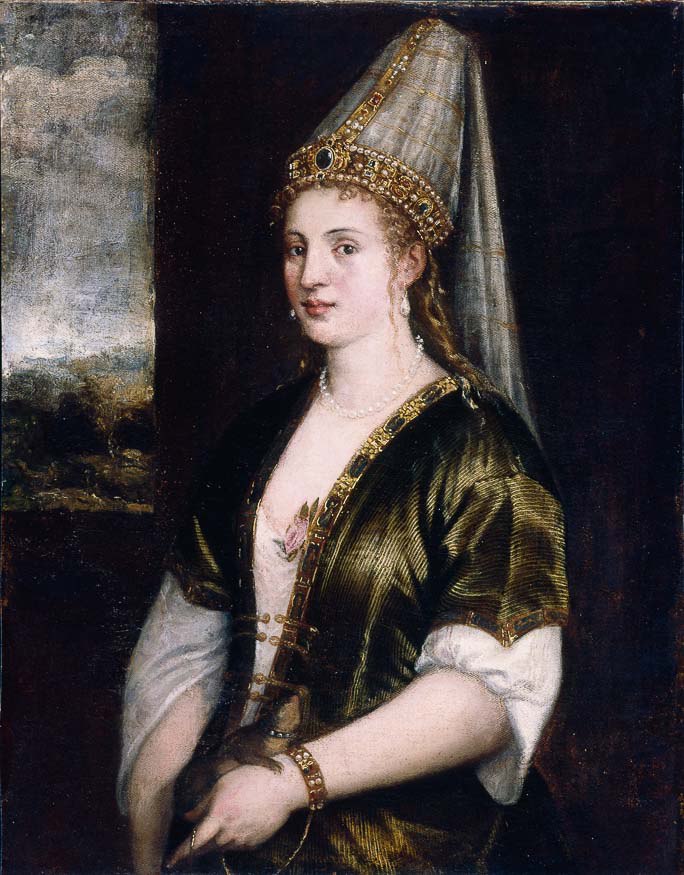 |
| La Sultana Rossa by Titian |
From Ancient Origins:
From 1520-1566, the Ottoman Empire was ruled by Suleiman I, who many claim was the greatest Sultan in history. He was also known as Suleiman the Magnificent or Kanuni – The Lawgiver. During his time in power, he made an impact on the history of many countries in Europe and the Middle East. Suleiman’s life took a radical change in 1520. In September of that year, his father Selim I passed away accidentally, and with his death, Suleiman’s carefree life in the Manisa province came to an end. He was called to the capital city to rule the empire. At the same time, he met the woman who would forever change his life. History has remembered her as Roxolena or Roksolana, Roxalene, Roxolane, and Rossa. However, the name she was called for most of her life is Hürrem. She received this name due to her cheerful personality.
Hürrem was born as Alexandra Lisowska in the town of Rohatyń, 68 km (42.3 miles) southeast of Lwów in the Crown of the Kingdom of Poland (today in Western Ukraine). In the 1520s Crimean Tatars captured her during one of their raids in this region. They took her as a slave to a major center of the slave trade in the Crimean city of Kaffa. Then she was transported to Constantinople and selected for the harem. Hürrem’s influence on Suleiman was almost immediate - it only took a few months from the day that she met Sultan Suleiman to the moment when she became the most important consort in the harem .
Due to her beauty and intelligence she quickly came to the attention of the Sultan. At the same moment she attracted the jealousy of her rivals in the harem, including Mahidevran Sultan, mother of the heir apparent Mustafa. Historians note that these rivalries led to a few attempts to take Hürrem’s life. The most famous is Mahidevran's attack on Hürrem, which was followed by Suleiman banishing his former favorite, and her son, to the provincial capital of Manisa.
[...]
Suleiman was not only a sultan, but a poet. Many of his poems are dedicated to Hürrem after she became his wife. He signed these poems as "Muhibbi," meaning "lover" or "sweetheart." This is one example of a poem he wrote:
Throne of my lonely niche, my wealth, my love, my moonlight.
My most sincere friend, my confidant, my very existence, my Sultan, my one and only love.
The most beautiful among the beautiful...
My springtime, my merry faced love, my daytime, my sweetheart, laughing leaf...
My plants, my sweet, my rose, the one only who does not distress me in this world...
My Istanbul, my Caraman, the earth of my Anatolia
My Badakhshan, my Baghdad and Khorasan
My woman of the beautiful hair, my love of the slanted brow, my love of eyes full of mischief...
I'll sing your praises always
I, lover of the tormented heart, Muhibbi of the eyes full of tears, I am happy.
I enjoyed the portrayal of Hürrem in The Magnificent Century (4 Seasons, 2011-2014)
The Turkish production Muhteşem Yüzyıl is based upon the sixteenth century life of Suleiman the Magnificent, sultan of the Ottoman Empire, and his marriage to the Russian Christian captive Alexandra, called Hürrem, who became his co-ruler. On one level the drama can be seen as a Turkish soap opera, and an extremely soapy one at that. However, it depicts the thriving slave trade of fair-skinned women that endured for hundreds of years in Central Europe and Asia in order to fill the harems of wealthy Turks with white girls. The story of Hürrem is the tale of a woman who through intelligence and determination overcame the life of slavery to which she had been condemned. Not only through brains and grit, but through the love she shares with Suleiman, she manages to become his legal wife and the mother of five of his children. In the meantime, every attempt is made by other members of the Sultan's household to destroy Hürrem. Most of the episodes deal with her ongoing power struggles with the Sultan's mother Hafsa and with Mahidevran, the mother of the Sultan's oldest son. The Sultan's grand vizier and brother-in-law Ibrahim Pargali also tries many times to ruin Hürrem and her influence with Suleiman but by doing so brings about his own destruction. Muhteşem Yüzyıl was a run-away success in the Middle East, but for some reason only Season 1 is available on Netflix. The entire series can be watched on YouTube but the later episodes are without subtitles. I found the synopses on Facebook which helped me to follow the drama, HERE. Share


















3 comments:
If today's Muslims were like the Ottoman Empire, an Islamic Europe would not be a bad thing.
I disagree. The Ottomans routinely kidnapped girls from Russia and Eastern Europe to be sex slaves in harems. It was the largest slave trade in the history of the world, surpassing even the African slave trade, and went on for much longer.
Of course, the white slave trade is still going on, to an extent, as is the slave trade in Africa.
Post a Comment